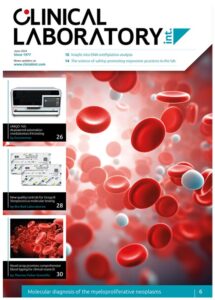NIH, FDA and 15 private organizations join forces to increase effective gene therapies for rare diseases
The National Institutes of Health, U.S. Food and Drug Administration, 10 pharmaceutical companies and five non-profit organizations have partnered to accelerate development of gene therapies for the 30 million Americans who suffer from a rare disease.
. While there are approximately 7,000 rare diseases, only two heritable diseases currently have FDA-approved gene therapies. The newly launched Bespoke Gene Therapy Consortium (BGTC) < https://www.nih.gov/ research-training/accelerating-medicinespartnership-amp/bespoke-gene-therapyconsortium >, part of the NIH Accelerating Medicines Partnership (AMP) program and project-managed by the Foundation for the National Institutes of Health (FNIH), aims to optimize and streamline the gene therapy development process to help fill the unmet medical needs of people with rare diseases.
Most rare diseases are caused by a defect in a single gene that could potentially be targeted with a customized or ‘bespoke’ therapy that corrects or replaces the defective gene,” said NIH Director Francis S. Collins, M.D., Ph.D. “There are now significant opportunities to improve the complex development process for gene therapies that would accelerate scientific progress and, most importantly, provide benefit to patients by increasing the number of effective gene therapies.”
A single rare disease affects small numbers of people, but rare diseases collectively affect millions. Most rare inherited diseases stem from a specific gene mutation that is already known, making gene therapy a promising therapeutic approach. However, gene therapy development for rare diseases is highly complex, time consuming and expensive. Moreover, the development process is stymied by limited access to tools and technologies, lack of standards across the field, and a one-disease-at-a-time approach to therapeutic development. A standardized therapeutic development model that includes a common gene delivery technology (a vector) could allow for a more efficient approach to specific gene therapies, saving time and cost.
“Rare diseases affect 25 to 30 million Americans, but because any given rare disorder affects so few patients, companies often are reluctant or unable to invest the years of research and millions of dollars necessary to develop, test and bring individualized gene therapy treatments for a single disease to market,” said Joni L. Rutter, Ph.D., acting director of NIH’s National Center for Advancing Translational Sciences (NCATS). “The BGTC aims to make it easier, faster and less expensive to pursue bespoke gene therapies in order to incentivize more companies to invest in this space and bring treatments to patients.”
“By leveraging on experience with a platform technology and by standardizing processes, gene therapy product development can be accelerated to allow more timely access to promising new therapies for patients who need them most,” said Peter Marks, M.D., Ph.D., director of FDA’s Center for Biologics Evaluation and Research. “FDA is committed to developing a regulatory paradigm that can advance gene therapies to meet the needs of patients with rare diseases.”
A primary aim of BGTC is to improve understanding of the basic biology of a common gene delivery vector known as the adeno-associated virus (AAV). BGTC researchers will examine the biological and mechanistic steps involved in AAV vector production, vector delivery of genes into human cells and how therapeutic genes are activated in target cells. These results will provide important information for improving the efficiency of vector manufacturing and enhancing the overall therapeutic benefit of AAV gene therapy.
To improve and accelerate gene and vector manufacturing and production processes, the BGTC program will develop a standard set of analytic tests to apply to the manufacture of viral vectors made by consortium researchers. Such tests could be broadly applicable to different manufacturing methods and make the process of developing gene therapies for very rare conditions much more efficient.
NIH and private partners will contribute approximately $76 million over five years to support BGTC-funded projects.



